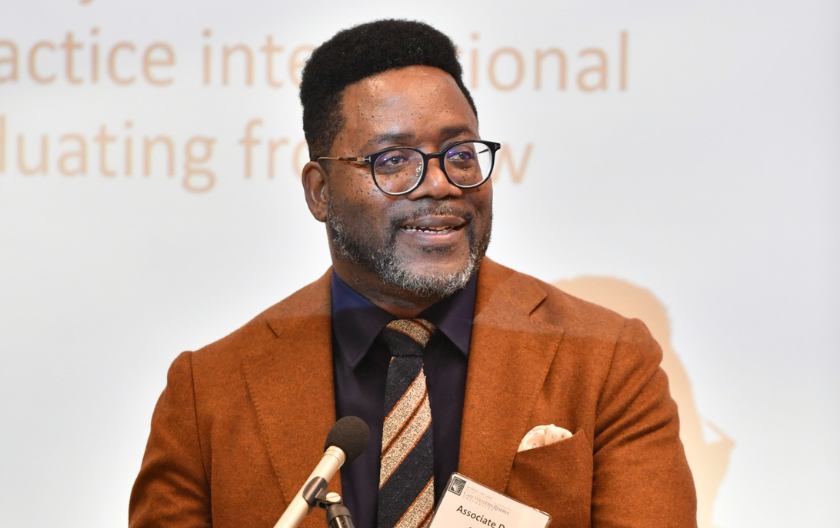Back in 2020, in an ongoing commitment to diversity and inclusion, Case Western Reserve University School of Law began to pursue strategic partnerships with select Historically Black Colleges and Universities (HBCUs) designed to encourage a greater number of under-represented minority students to attend the law school. Since then, the number of partnerships forged has reached nearly a dozen and include Hispanic- and Native-American-serving institutions of higher education.
“At Case Western Reserve University School of Law, diversity is a core value,” said Bryan Adamson, the David L. and Ann Brennan Professor of Law and associate dean of diversity and inclusion at the law school, who has taken the lead in negotiating the partnerships. “We believe these partnerships align with our values—that access to justice is essential for a democratic society. Diversity in legal education and, by extension, the legal profession, better ensures access to—and the quality of—legal services that all communities deserve.”
These pipeline agreements began with Hampton University, Morehouse College, Spelman College and Xavier University (Louisiana). Since then, the school has added Tuskegee University, Tougaloo College, University of Alaska Anchorage, Dominican University, Bemidji State University, the University of North Carolina-Pembroke and John Jay College of Criminal Justice.
“We have strengthened our efforts to attract a more diverse law student body by offering incentives to students graduating from those institutions to apply and enroll at the School of Law,” said law school Co-Dean, Michael Scharf. Those incentives include, among other things, substantial scholarships, book stipends and alumni mentorship opportunities.
The most significant incentive is the new JumpStart program, which is available to students from partner institutions tuition-free. The JumpStart program provides incoming first-year students the opportunity to embark upon their law school career beginning in June. The program offers an eight-week summer experience designed to help students excel in law school and beyond.
JumpStart students enroll in the 3-credit Criminal Law course, which they would typically take in the fall of their first year. In addition to their Criminal Law course, 1L students take advantage of a variety of add-on academic programs focusing on class preparation, legal writing and analysis, exam-taking, professionalism and ethics, time and stress management techniques and establishing effective work-life balance. In addition, the 1L students are assigned upperclass mentors, and meet with current students, faculty and local members of the legal profession.
“Law school educators have long known that some students who struggle during their first semester or first year find their equilibrium soon afterwards and excel throughout the rest of their legal career,” said Co-Dean Jessica Berg. “First generation students, under-represented minority students, students with disabilities and veterans may benefit from starting in the summer and getting a jumpstart on acclimating to law school. Other students may appreciate the opportunity to start earlier and take a lighter course load in the fall.”
“Regardless of students’ motivations, we are certain that the JumpStart experience at CWRU Law will well-position them for the learning of law by giving them the skills, tools, and support for academic success,” added Scharf. Our JumpStart program has proven to be highly successful with 1L students in general, and specifically with those hailing from our partnership institutions.
“Our law school endeavors seek to advance the goals of our university-wide North Star initiative with a steadfast commitment to diversity, equity, inclusion and belonging,” Adamson says. Indeed, many of the universities involved in the law school partnerships include members of Case Western Reserve’s North Star initiative developed by Provost and Executive Vice President Ben Vinson III to “build long-term academic partnerships designed to transform the way we enact higher education – breaking down silos and bridging across various types of institutions to achieve the true meaning of our collective educational goals.”
More strategic partnerships are in negotiation. In just two years, the law school’s strategic partnership initiative with HBCUs, HSIs and NASI’s has succeeded in substantially growing the diversity of the law school student body across minority, LGBTQ, veterans and first-generation identities.
“With our pipeline partnerships and JumpStart program, we have been successful not only at enhancing our diversity, but retention and sense of belonging as well,” said Adamson “For any institution serious about expanding opportunities for those historically under-represented in law school and the legal profession, we believe this partnership approach to attracting, admitting and retaining a diverse student body can be the model going forward.”


